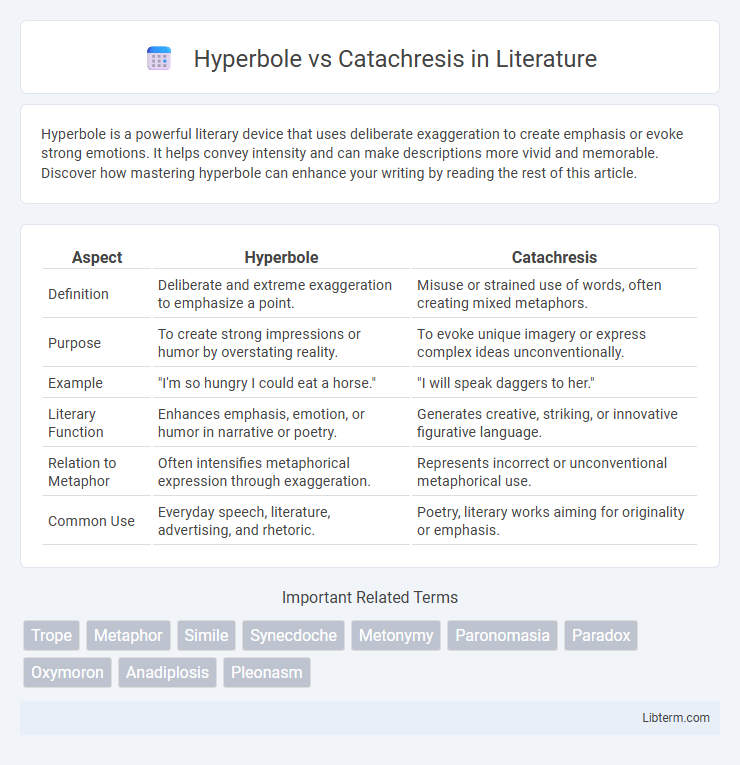Hyperbole is a powerful literary device that uses deliberate exaggeration to create emphasis or evoke strong emotions. It helps convey intensity and can make descriptions more vivid and memorable. Discover how mastering hyperbole can enhance your writing by reading the rest of this article.
Table of Comparison
| Aspect | Hyperbole | Catachresis |
|---|---|---|
| Definition | Deliberate and extreme exaggeration to emphasize a point. | Misuse or strained use of words, often creating mixed metaphors. |
| Purpose | To create strong impressions or humor by overstating reality. | To evoke unique imagery or express complex ideas unconventionally. |
| Example | "I'm so hungry I could eat a horse." | "I will speak daggers to her." |
| Literary Function | Enhances emphasis, emotion, or humor in narrative or poetry. | Generates creative, striking, or innovative figurative language. |
| Relation to Metaphor | Often intensifies metaphorical expression through exaggeration. | Represents incorrect or unconventional metaphorical use. |
| Common Use | Everyday speech, literature, advertising, and rhetoric. | Poetry, literary works aiming for originality or emphasis. |
Understanding Hyperbole: Definition and Examples
Hyperbole is a rhetorical device involving deliberate exaggeration to emphasize a point or evoke strong feelings, often seen in phrases like "I'm so hungry I could eat a horse" or "This book weighs a ton." It serves to create vivid imagery and amplify the emotional impact of statements, distinguishing it from literal expressions. Understanding hyperbole enhances comprehension of figurative language in literature, advertising, and everyday communication.
What is Catachresis? Meaning and Usage
Catachresis is a rhetorical device involving the deliberate misuse or strained use of words, often to create a striking or paradoxical effect by mixing metaphors or using inappropriate terms. It is commonly employed in literature and speech to evoke vivid imagery or highlight absurdity by applying language in unconventional ways. Unlike hyperbole, which exaggerates for emphasis, catachresis challenges normal semantic boundaries, producing unique or thought-provoking expressions.
Key Differences Between Hyperbole and Catachresis
Hyperbole involves deliberate exaggeration to emphasize a point or evoke strong feelings, often used in rhetoric and literature for dramatic effect. Catachresis refers to the incorrect or strained use of words, often mixing metaphors or misapplying terms, creating a paradoxical or absurd expression. The key difference lies in hyperbole's intentional overstatement to enhance meaning, while catachresis results from linguistic misuse or creative distortion of language.
The Power of Exaggeration: Hyperbole in Literature
Hyperbole is a deliberate exaggeration used in literature to create emphasis or evoke strong emotions, making descriptions more vivid and impactful. Unlike catachresis, which involves the misuse or strained use of words to produce a mixed metaphor or rhetorical effect, hyperbole amplifies reality to enhance narrative intensity or humor. Writers employ hyperbole to convey characters' feelings or highlight key themes, leveraging its power to engage readers on an emotional level.
Catachresis as Creative Misuse: Literary Applications
Catachresis, a creative misuse of language, intentionally employs mixed metaphors or strained figures of speech to generate striking, unconventional imagery in literature. Unlike hyperbole, which exaggerates for emphasis, catachresis leverages semantic tension to evoke novelty and provoke thought, as seen in works by Shakespeare and contemporary poets. This rhetorical device challenges standard linguistic norms, enriching literary expression through unexpected, imaginative wordplay.
Semantic Impact: How Hyperbole Shapes Meaning
Hyperbole amplifies meaning by exaggerating facts beyond reality, intensifying emotional response and highlighting significance through deliberate overstatement. This semantic inflation creates vivid imagery that reinforces persuasive or dramatic effects, enhancing the listener's or reader's engagement. Unlike catachresis, which combines incongruent concepts to produce novel interpretations, hyperbole's semantic impact lies in magnifying truth to shape stronger, more memorable messages.
Ambiguity and Innovation: The Role of Catachresis
Catachresis thrives on ambiguity by deliberately employing mixed metaphors or unconventional word uses that challenge standard linguistic boundaries, fostering innovative expressions. Unlike hyperbole, which exaggerates for effect, catachresis disrupts normative semantics to create new meanings and provoke reflection. This inventive ambiguity enables writers to expand language's expressive capacity and explore novel conceptual connections.
Hyperbole vs. Catachresis in Everyday Language
Hyperbole exaggerates reality for emphasis or effect, such as saying "I'm starving" when only slightly hungry. Catachresis involves the incorrect or strained use of a word or phrase, like calling a leg of a table a "foot," extending meaning beyond its traditional sense. In everyday language, hyperbole enhances expression and humor, while catachresis creates novel or confusing metaphors that challenge conventional word usage.
Famous Authors and Their Use of Hyperbole and Catachresis
William Shakespeare frequently employed hyperbole to heighten emotional impact, as seen in Romeo's declaration that Juliet's beauty "outshines the sun." Samuel Johnson, on the other hand, often used catachresis to challenge conventional language, crafting metaphors that stretched the bounds of common usage for rhetorical effect. Both devices showcase the authors' mastery of language to evoke strong imagery and deepen literary resonance.
When to Use Hyperbole or Catachresis: Writing Tips
Use hyperbole to create dramatic emphasis or humor by exaggerating facts beyond reality, making it ideal for persuasive or narrative writing. Employ catachresis when conventional language fails to express complex or abstract ideas, leveraging deliberate mixed metaphors for stylistic effect in poetry, satire, or creative prose. Choosing hyperbole suits clear emotional impact, while catachresis supports inventive, unconventional expression that challenges readers' expectations.
Hyperbole Infographic

 libterm.com
libterm.com